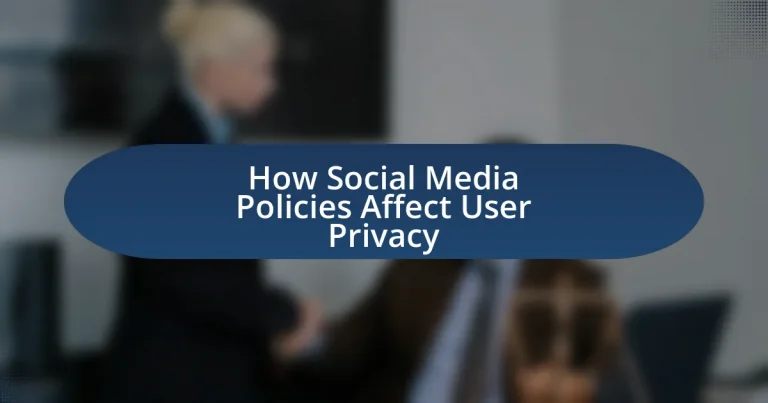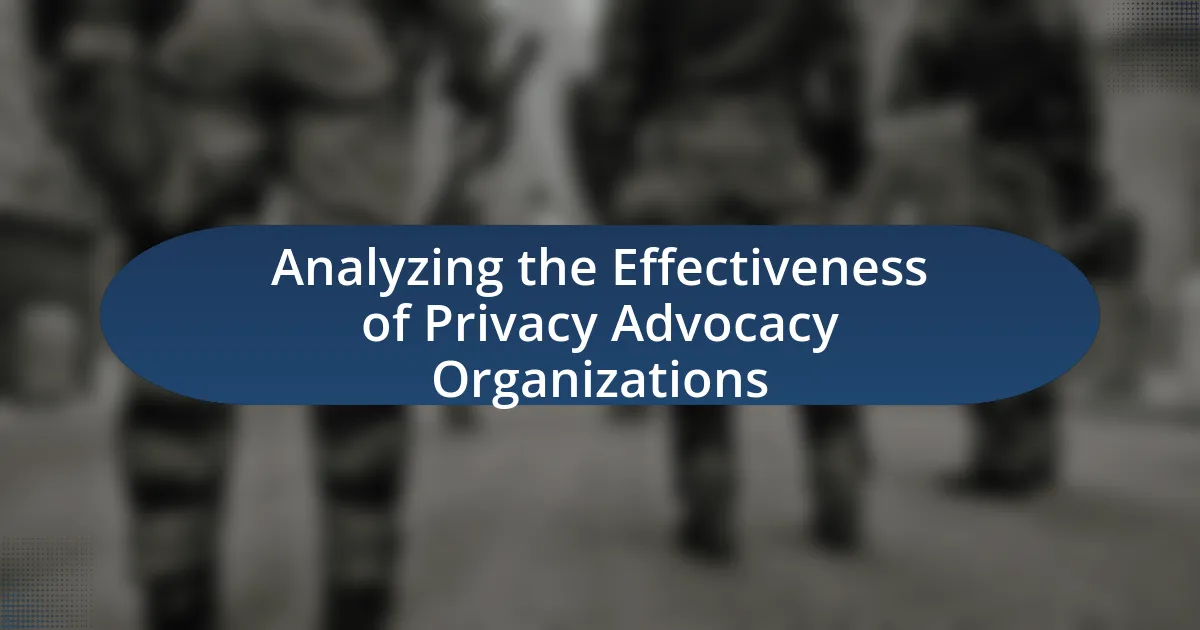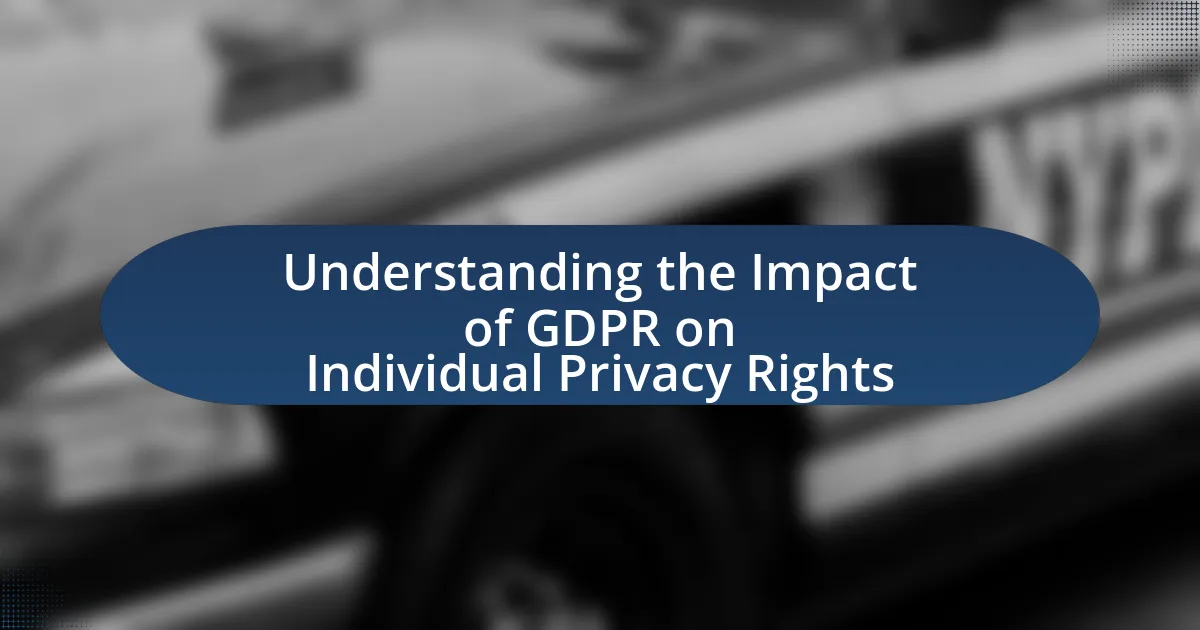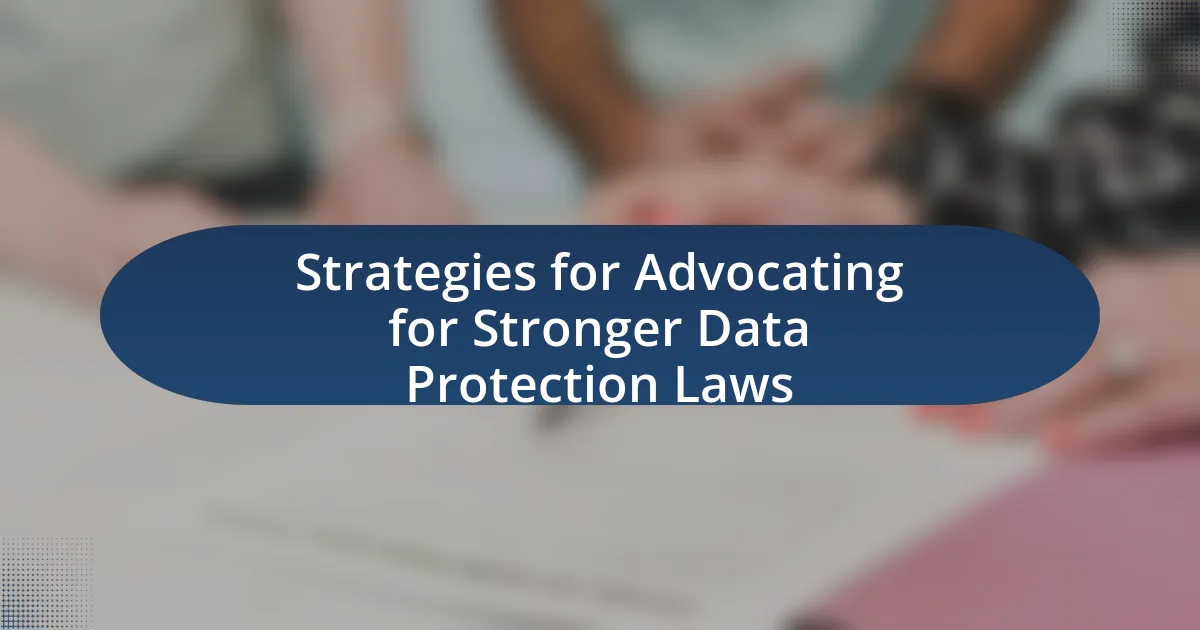The article examines how social media policies impact user privacy, focusing on the collection, use, and sharing of personal data. It outlines key components of these policies, including user consent, data retention, and third-party access, while highlighting the significance of regulations like the General Data Protection Regulation (GDPR) in enhancing user privacy rights. Additionally, the article discusses the role of terms of service, user perceptions of privacy, and the implications of non-compliance with privacy laws. It also provides insights into best practices users can adopt to protect their privacy on social media platforms, emphasizing the importance of transparency, user education, and effective privacy management strategies.
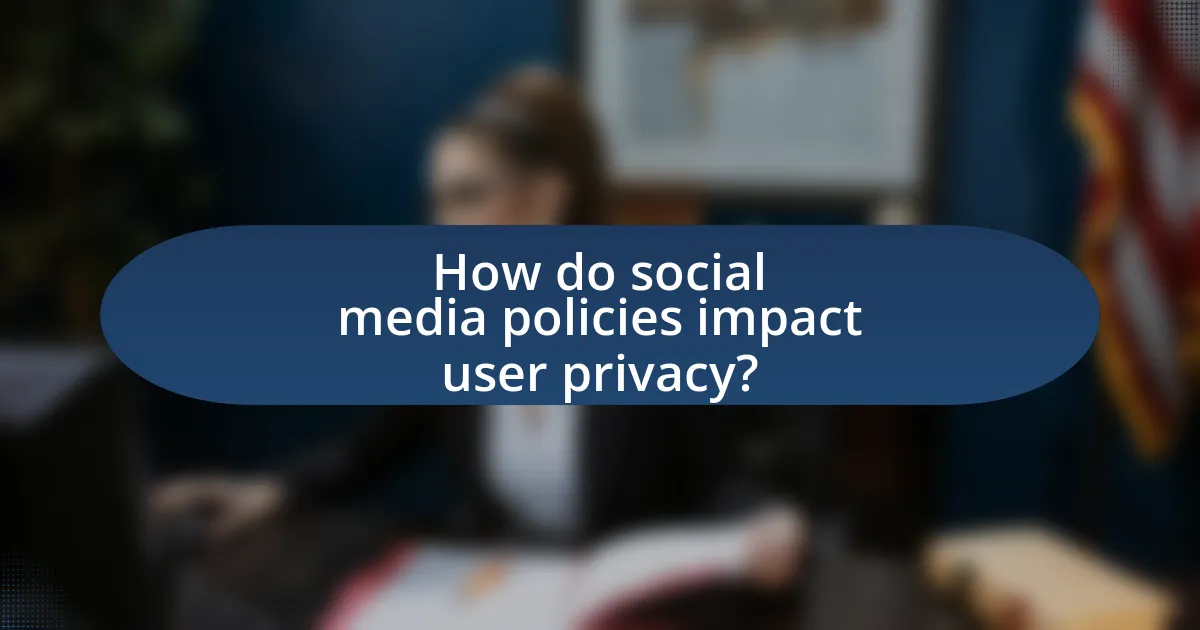
How do social media policies impact user privacy?
Social media policies significantly impact user privacy by dictating how personal data is collected, used, and shared. These policies establish the framework for user consent, data retention, and third-party access, which directly influence the level of privacy users experience. For instance, the General Data Protection Regulation (GDPR) in Europe mandates that social media platforms obtain explicit consent from users before processing their data, thereby enhancing user privacy rights. Additionally, policies that allow users to control their privacy settings can empower individuals to manage their personal information more effectively, reducing the risk of unauthorized access or misuse.
What are the key components of social media policies?
The key components of social media policies include guidelines for acceptable use, privacy protections, content moderation, and compliance with legal regulations. Acceptable use guidelines define appropriate behavior and interactions on social media platforms, ensuring users understand what is permissible. Privacy protections outline how user data is collected, stored, and shared, emphasizing the importance of user consent and data security. Content moderation policies establish standards for managing user-generated content, including procedures for addressing harmful or inappropriate material. Compliance with legal regulations ensures that the policies align with laws such as the General Data Protection Regulation (GDPR) and the Children’s Online Privacy Protection Act (COPPA), which mandate specific protections for user privacy and data handling.
How do these components define user privacy?
User privacy is defined by components such as data collection practices, user consent mechanisms, and data protection policies. These components establish the boundaries of how personal information is gathered, used, and shared by social media platforms. For instance, data collection practices dictate what types of information are collected, while user consent mechanisms ensure that individuals have control over their data, as evidenced by regulations like the General Data Protection Regulation (GDPR), which mandates explicit consent for data processing. Additionally, robust data protection policies are essential for safeguarding user information from unauthorized access and breaches, thereby reinforcing user trust and privacy.
What role do terms of service play in user privacy?
Terms of service play a critical role in user privacy by outlining how a company collects, uses, and protects personal data. These legal agreements inform users about their rights and the extent of data sharing, which directly impacts their privacy. For instance, many social media platforms specify in their terms of service the types of data collected, such as location, browsing history, and user-generated content, and how this data may be shared with third parties. This transparency is essential for users to make informed decisions about their privacy and data security. Furthermore, violations of these terms can lead to legal consequences for companies, reinforcing the importance of adhering to privacy standards as stipulated in these agreements.
Why is user privacy important in the context of social media?
User privacy is crucial in the context of social media because it protects individuals from unauthorized data collection and misuse. Social media platforms often gather vast amounts of personal information, which can be exploited for targeted advertising, identity theft, or even surveillance. According to a 2021 report by the Pew Research Center, 81% of Americans feel that the potential risks of companies collecting their personal data outweigh the benefits. This statistic underscores the widespread concern regarding privacy violations and the need for robust privacy policies to safeguard user information.
What are the potential risks of compromised user privacy?
Compromised user privacy poses significant risks, including identity theft, financial fraud, and unauthorized data exploitation. When personal information is exposed, malicious actors can impersonate individuals, leading to financial losses; for instance, the Federal Trade Commission reported that identity theft affected over 1.4 million consumers in 2020 alone. Additionally, compromised data can be used for targeted phishing attacks, increasing the likelihood of further breaches. Furthermore, loss of privacy can result in reputational damage and emotional distress for individuals, as sensitive information may be misused or publicly disclosed. These risks underscore the critical importance of robust social media policies to protect user privacy effectively.
How does user privacy affect user trust in social media platforms?
User privacy significantly impacts user trust in social media platforms, as individuals are more likely to engage with services that protect their personal information. When platforms implement robust privacy policies, users feel secure, leading to increased trust and willingness to share content. Conversely, breaches of privacy or unclear data usage policies can result in distrust, as evidenced by a 2021 survey by the Pew Research Center, which found that 81% of Americans feel that the risks of sharing personal information on social media outweigh the benefits. This correlation indicates that effective privacy measures are essential for maintaining user trust and fostering a positive user experience on social media platforms.
What are the legal frameworks governing social media policies?
The legal frameworks governing social media policies primarily include data protection laws, privacy regulations, and content moderation guidelines. Key examples are the General Data Protection Regulation (GDPR) in the European Union, which mandates strict data handling and user consent requirements, and the California Consumer Privacy Act (CCPA) in the United States, which grants consumers rights over their personal information. These frameworks establish obligations for social media companies regarding user data collection, storage, and sharing, ensuring user privacy is protected. Compliance with these laws is essential for social media platforms to avoid legal penalties and maintain user trust.
How do regulations like GDPR influence social media policies?
Regulations like GDPR significantly influence social media policies by mandating stricter data protection and privacy standards. Social media platforms must implement comprehensive user consent mechanisms, ensuring that users are informed about data collection and usage. For instance, GDPR requires explicit consent for processing personal data, compelling platforms to revise their privacy policies and user agreements to comply. Additionally, the regulation enforces the right to access and delete personal data, prompting social media companies to develop features that allow users to manage their information effectively. Non-compliance can result in substantial fines, as evidenced by the €50 million penalty imposed on Google in 2019 for GDPR violations, highlighting the critical impact of such regulations on social media practices.
What are the implications of non-compliance with privacy laws?
Non-compliance with privacy laws can lead to significant legal and financial repercussions for organizations. Entities that fail to adhere to regulations such as the General Data Protection Regulation (GDPR) may face fines up to 4% of their annual global revenue or €20 million, whichever is higher. Additionally, non-compliance can result in reputational damage, loss of customer trust, and potential lawsuits from affected individuals. For instance, in 2021, British Airways was fined £20 million for a data breach that compromised the personal information of approximately 400,000 customers, highlighting the severe financial implications of failing to protect user data.
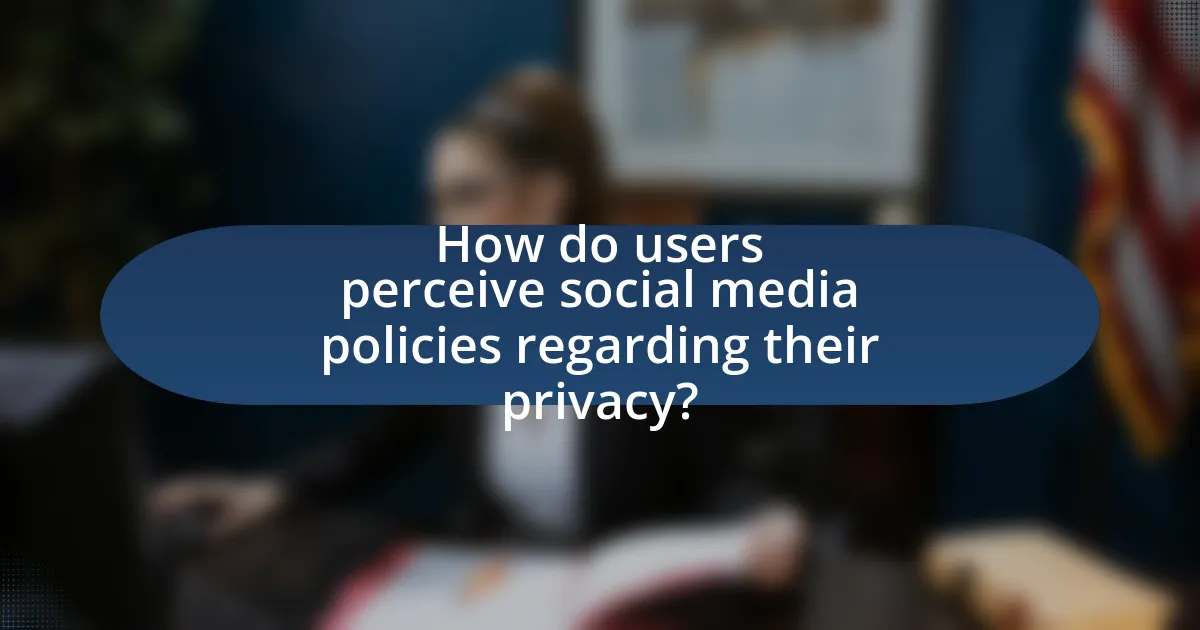
How do users perceive social media policies regarding their privacy?
Users generally perceive social media policies regarding their privacy with skepticism and concern. Research indicates that many users feel that these policies are often unclear and difficult to understand, leading to mistrust. A study by the Pew Research Center found that 79% of Americans are concerned about how their data is being used by social media companies. Furthermore, users frequently express a desire for greater transparency and control over their personal information, as evidenced by the increasing demand for privacy-focused features and settings on platforms. This perception is shaped by past data breaches and scandals, which have heightened awareness and anxiety about privacy issues in the digital landscape.
What factors influence user perceptions of privacy policies?
User perceptions of privacy policies are influenced by factors such as clarity, transparency, user control, and trustworthiness. Clarity in language and structure helps users understand the policies, while transparency regarding data collection and usage fosters a sense of security. User control over personal data, including options to opt-out or modify settings, enhances perceptions of privacy. Trustworthiness is established through the reputation of the organization and compliance with regulations, such as the General Data Protection Regulation (GDPR), which mandates clear communication about data practices. Studies have shown that users are more likely to engage with platforms that demonstrate these factors effectively, leading to improved perceptions of privacy policies.
How does transparency in policies affect user trust?
Transparency in policies significantly enhances user trust. When organizations clearly communicate their policies regarding data usage, privacy, and security, users feel more informed and secure about how their information is handled. A study by the Pew Research Center found that 79% of Americans are concerned about how companies use their data, indicating that transparency can alleviate some of these concerns by fostering a sense of accountability. Furthermore, organizations that openly share their practices and respond to user inquiries build a reputation for reliability, which is crucial in maintaining user loyalty and trust.
What role does user education play in understanding privacy policies?
User education is crucial for understanding privacy policies as it empowers individuals to comprehend their rights and the implications of data usage. Educated users are more likely to read and interpret privacy policies accurately, leading to informed decisions about their personal information. Research indicates that only 9% of users read privacy policies in detail, highlighting the need for educational initiatives that clarify complex legal language and concepts. By enhancing user literacy regarding privacy issues, organizations can foster a culture of transparency and trust, ultimately improving user engagement and compliance with privacy standards.
How do different demographics view social media privacy?
Different demographics view social media privacy with varying degrees of concern and understanding. For instance, younger users, particularly Millennials and Gen Z, often exhibit a more relaxed attitude towards privacy, prioritizing connectivity and engagement over stringent privacy measures. In contrast, older demographics, such as Baby Boomers and Gen X, tend to be more cautious and value privacy more highly, often expressing concerns about data security and the potential misuse of personal information. A study by the Pew Research Center in 2021 found that 64% of adults aged 50 and older believe that social media companies do not do enough to protect user privacy, compared to only 38% of users aged 18-29. This indicates a significant generational divide in perceptions of social media privacy, influenced by factors such as digital literacy, past experiences with data breaches, and the overall understanding of privacy implications in the digital age.
What are the privacy concerns of younger users compared to older users?
Younger users face distinct privacy concerns compared to older users primarily due to their higher engagement with social media and digital platforms. Younger individuals often share more personal information online, which increases their vulnerability to data breaches and cyberbullying. A study by the Pew Research Center found that 59% of teens have experienced some form of online harassment, highlighting their exposure to risks that older users may not encounter as frequently. Additionally, younger users may lack the experience or knowledge to understand privacy settings and data management, leading to unintentional oversharing. In contrast, older users typically exhibit more caution regarding their online presence, often prioritizing privacy and security, which reflects their different life experiences and familiarity with technology.
How do cultural differences impact perceptions of privacy on social media?
Cultural differences significantly impact perceptions of privacy on social media by shaping individuals’ expectations and behaviors regarding personal information sharing. For instance, in collectivist cultures, such as those in East Asia, individuals may prioritize community and familial relationships over personal privacy, leading to a more open sharing of information. Conversely, in individualistic cultures like those in North America, there is a stronger emphasis on personal privacy and autonomy, resulting in more cautious sharing practices. Research by the Pew Research Center indicates that 64% of Americans feel that their personal information is less secure than it was five years ago, reflecting a heightened concern for privacy that contrasts with attitudes in cultures where social interconnectedness is valued more highly than individual privacy.
What are common misconceptions about social media privacy policies?
Common misconceptions about social media privacy policies include the belief that these policies guarantee complete privacy and that users have full control over their data. In reality, social media platforms often retain the right to share user data with third parties, and users frequently overlook the implications of consent given during account creation. According to a 2021 study by the Pew Research Center, 79% of social media users expressed concern about how their data is used, yet many do not read privacy policies, leading to misunderstandings about data usage and sharing practices.
How do these misconceptions affect user behavior online?
Misconceptions about social media policies significantly influence user behavior online by fostering distrust and leading to reduced engagement. Users who believe that their privacy is not adequately protected may limit their interactions, share less personal information, or avoid certain platforms altogether. For instance, a survey by the Pew Research Center found that 81% of Americans feel they have little to no control over the data collected about them, which directly correlates with decreased participation in social media activities. This behavior stems from the fear of data misuse and a lack of understanding of privacy settings, ultimately shaping how users navigate and utilize online platforms.
What can be done to clarify these misconceptions?
To clarify misconceptions about how social media policies affect user privacy, comprehensive education and transparent communication are essential. Social media platforms should provide clear, accessible explanations of their privacy policies, detailing how user data is collected, used, and shared. Research indicates that users often misunderstand privacy settings; for instance, a study by the Pew Research Center found that 74% of users feel they have lost control over how their data is collected and used. By implementing user-friendly guides and interactive tools that illustrate privacy settings, platforms can enhance user understanding and trust.
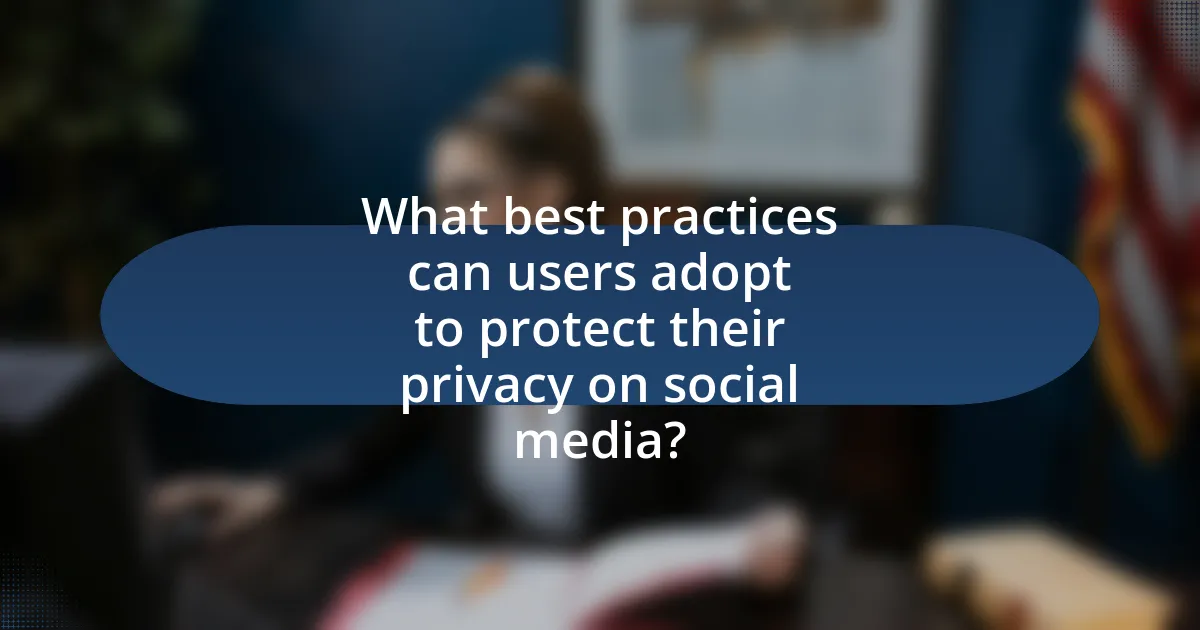
What best practices can users adopt to protect their privacy on social media?
Users can adopt several best practices to protect their privacy on social media, including adjusting privacy settings, being cautious about sharing personal information, and regularly reviewing friend lists. Adjusting privacy settings allows users to control who can see their posts and personal details, significantly reducing exposure to unwanted audiences. For instance, a study by the Pew Research Center found that 70% of social media users have adjusted their privacy settings to limit who can view their content. Additionally, users should avoid sharing sensitive information such as phone numbers, addresses, or financial details, as this can lead to identity theft or harassment. Regularly reviewing friend lists ensures that users only connect with trusted individuals, minimizing the risk of sharing information with potentially harmful contacts.
How can users effectively manage their privacy settings?
Users can effectively manage their privacy settings by regularly reviewing and adjusting their account settings on social media platforms. This includes accessing the privacy settings menu, where users can control who sees their posts, limit data sharing with third-party applications, and manage location settings. Research indicates that 70% of users are unaware of the full extent of their privacy options, highlighting the importance of proactive engagement with these settings. By taking these steps, users can significantly enhance their online privacy and security.
What specific settings should users adjust for better privacy?
Users should adjust their privacy settings to limit data sharing, control who can see their posts, and manage app permissions. Specifically, users should set their profiles to private, restrict friend requests to known contacts, and disable location sharing. Additionally, users should review and modify third-party app access to their accounts, ensuring that only trusted applications have permission. Research indicates that 70% of users are unaware of the privacy settings available on social media platforms, which can lead to unintentional data exposure.
How often should users review their privacy settings?
Users should review their privacy settings at least once every three to six months. Regular reviews are essential due to frequent updates in social media policies and privacy features, which can impact user data security. According to a 2021 survey by the Pew Research Center, 81% of Americans feel they have little to no control over the data collected about them, highlighting the importance of proactive management of privacy settings.
What strategies can users employ to safeguard their personal information?
Users can safeguard their personal information by implementing strong privacy settings on social media platforms. Adjusting these settings allows users to control who can see their posts, personal details, and friend lists, thereby reducing exposure to potential threats. Additionally, users should regularly review and update their privacy settings, as social media platforms often change their policies and features.
Using unique, complex passwords for each account further enhances security, as studies show that weak passwords are a primary cause of data breaches. Enabling two-factor authentication adds an extra layer of protection, making unauthorized access significantly more difficult. Furthermore, users should be cautious about the information they share online, avoiding posting sensitive details that could be exploited by malicious actors.
Educating oneself about phishing scams and recognizing suspicious links or messages is crucial, as these tactics are commonly used to compromise personal information. Lastly, users should consider using privacy-focused tools, such as VPNs and encrypted messaging apps, to enhance their online security.
How can users recognize and avoid phishing attempts on social media?
Users can recognize and avoid phishing attempts on social media by being vigilant about suspicious messages and links. Phishing attempts often involve unsolicited messages that create a sense of urgency or fear, prompting users to click on malicious links or provide personal information. For instance, legitimate organizations typically do not request sensitive information through direct messages. Additionally, users should verify the sender’s profile, looking for signs of impersonation, such as misspellings in the username or a lack of mutual connections. According to the Anti-Phishing Working Group, in 2021, over 83% of phishing attacks were conducted via email and social media, highlighting the importance of user awareness in these platforms. By maintaining skepticism towards unexpected communications and utilizing privacy settings to limit exposure, users can significantly reduce their risk of falling victim to phishing scams.
What role does strong password management play in protecting privacy?
Strong password management is crucial in protecting privacy by preventing unauthorized access to personal accounts and sensitive information. Effective password management practices, such as using complex passwords, regularly updating them, and employing unique passwords for different accounts, significantly reduce the risk of data breaches. According to a study by the Cybersecurity & Infrastructure Security Agency, 81% of data breaches are linked to weak or stolen passwords, highlighting the importance of robust password management in safeguarding user privacy.
What resources are available for users to stay informed about privacy issues?
Users can stay informed about privacy issues through various resources, including government websites, privacy advocacy organizations, and online courses. Government websites like the Federal Trade Commission (FTC) provide guidelines and updates on privacy regulations. Privacy advocacy organizations such as the Electronic Frontier Foundation (EFF) offer articles, reports, and tools to help users understand their rights. Additionally, online platforms like Coursera and edX offer courses on digital privacy and data protection, educating users on best practices and current trends. These resources collectively empower users to navigate privacy issues effectively.
How can users access reliable information about social media privacy policies?
Users can access reliable information about social media privacy policies by visiting the official websites of the respective social media platforms, where they typically publish their privacy policies in a dedicated section. These documents outline how user data is collected, used, and shared, ensuring transparency. Additionally, reputable third-party organizations and privacy advocacy groups, such as the Electronic Frontier Foundation, provide analyses and comparisons of privacy policies across different platforms, helping users understand the implications of these policies.
What organizations provide support for privacy-related concerns?
Organizations that provide support for privacy-related concerns include the Electronic Frontier Foundation (EFF), the American Civil Liberties Union (ACLU), and Privacy International. The EFF advocates for civil liberties in the digital world, focusing on issues like online privacy and government surveillance. The ACLU works to defend individual rights and liberties, including privacy rights, through litigation and advocacy. Privacy International is dedicated to fighting for the right to privacy across the globe, often engaging in research and policy advocacy to protect personal data. These organizations are recognized for their efforts in promoting and protecting privacy rights in the context of social media and beyond.
